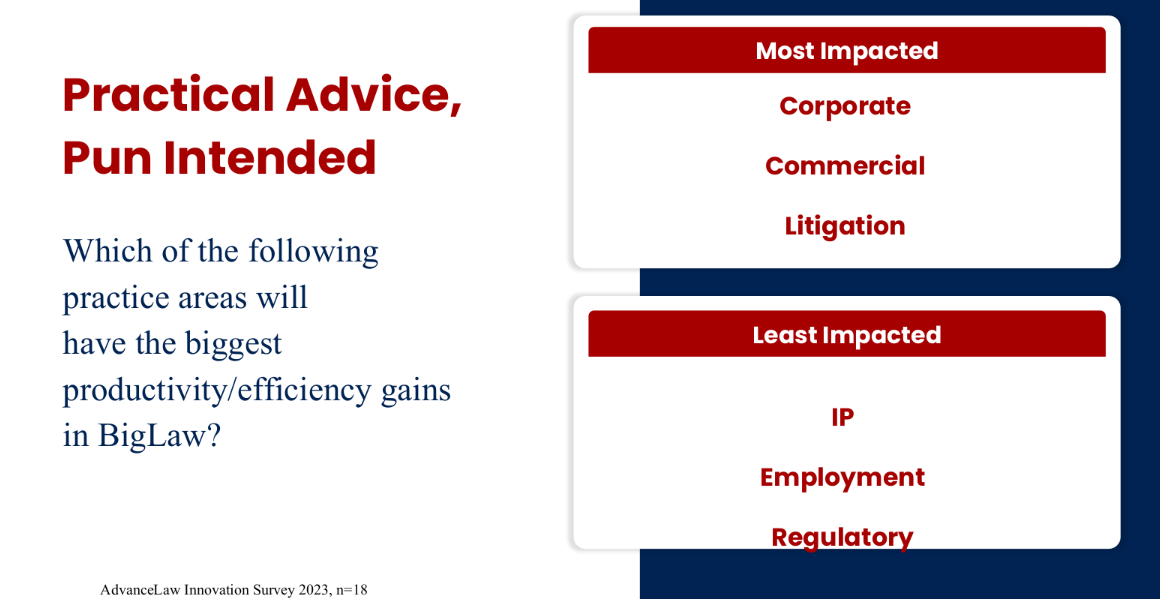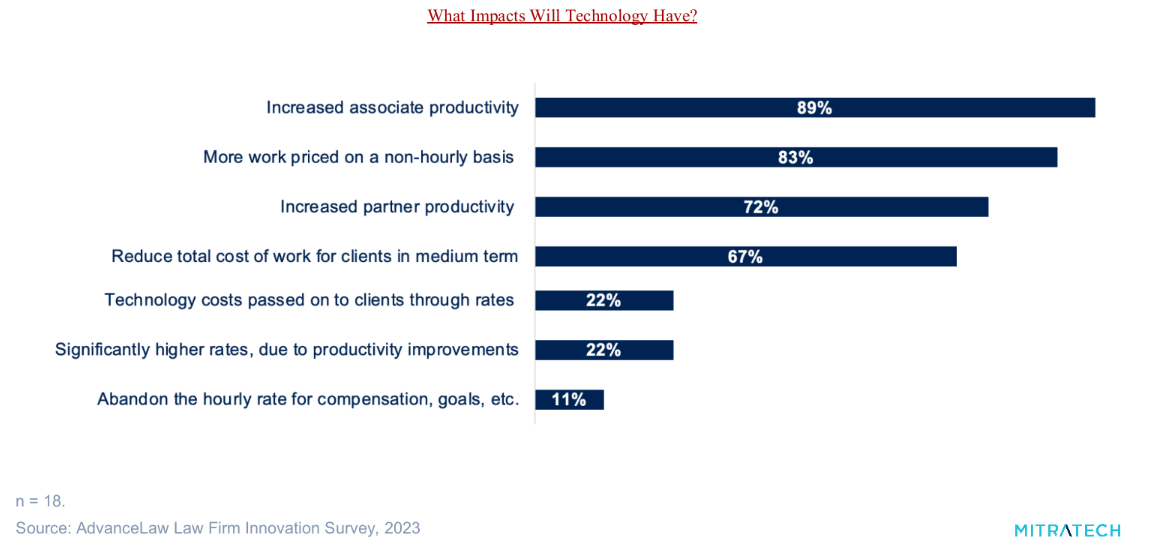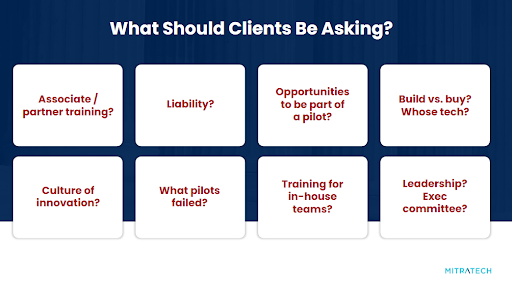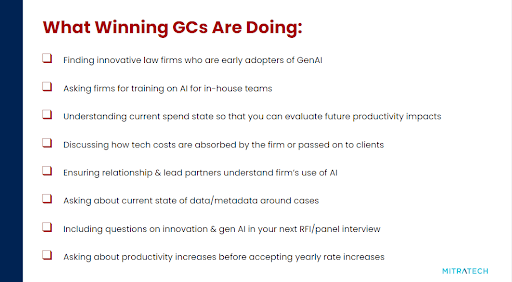GenAI is Reshuffling Big Law (and Both GCs and Firms Can Win)
AI is coming to the legal industry on many fronts, prompting conversations with internal clients, law firm clients, process and control teams, exec committees — you name it.
But if you haven’t had these discussions, don’t worry – you’re not alone (or behind)… yet.
In fact, an audience survey of our recent webinar revealed that over half of our in-house attendees hadn’t been contacted by firms to discuss GenAI.
That’s why we invited both GCs and law firm execs to our recent conversation with Mitratech’s AdvanceLaw, DXC Technology, Simmons & Simmons, and Holland & Knight to offer a dual perspective on AI’s rising impact on how we train lawyers, staff matters, and price legal work.
You can tune into the full conversation here, or read on for the recap!
A Growing Ecosystem of Impact – Where Law Firm Investments in Generative AI Meet the GC
AI is moving from a job for specialists to a job for every executive (at a mind-boggling pace) and our GC panelists shared the challenging and (sometimes conflicting) perspectives that come with advising the business on GenAI while also figuring out how internal teams and law firms should be leveraging it.
This pull between business partners and internal and external resources has affected law firms as well, with many making huge investments in gen AI. As a result, those in charge of AI initiatives have seen a huge shift in how lawyers are thinking about it.
As Martin Durkin, Innovation Partner, Holland & Knight, put it: “We’ve seen AI move from a toy that people were interested in into a tool, and our lawyers are seeing that and demanding that we find ways to incorporate that into their workflows to deliver higher-quality legal work.”
Narrowing the Conversation
AdvanceLaw conducted a survey in 2023 with about 18 different law firms to ask where their innovation focus has been over the last two years and next two years.
What we found was that increasingly, those investments are shifting to client-facing work. So where the firm previously was building an internal infrastructure and making things easier on the lawyers, now they’re just focused on streamlining their billable work and providing a better client experience.
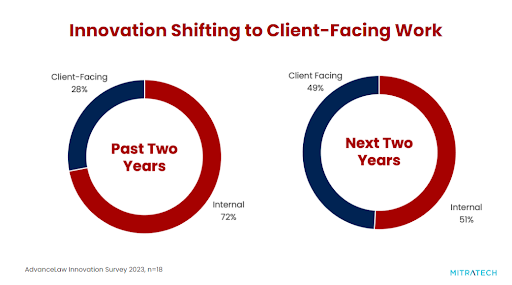
Which also explains why a lot of firms are still trying to figure out their strategy when it comes to GenAI — and finding out what clients want before initiating these conversations.
Bjarne Tellmann, General Counsel and Chief Legal Officer, Haleon Plc, explains, “I’ve had more than one managing partner of a large firm say they have half of the client base threatening to leave if we don’t have amazing use of GenAI in a fast time, and the other half say they will leave if they touch GenAI with a ten-foot pole.”
Because the truth is, the disruption period is just getting started. Bill Deckellman, when looking into how firms are training lawyers on GenAI, explains, “Nobody has figured it out yet – even the experts. We all need to be working with a lot of partners and looking both internally and externally. And that starts with your clients – and your talent. How are you going to upscale your people?”
Practical Advice: Where the AI Impact is Landing and Where to Direct Your Focus
One thing is for certain: firms are investing in and testing GenAI, and they have the resources to do so. Consider the following statistics from AdvanceLaw’s Survey findings:
What’s less clear is exactly where they expect to see the biggest ROI on those investments. Or, in other words, which practice areas they think are likely to see the biggest productivity/efficiency gains in BigLaw.
Corporate, Commercial, and Litigation came in as the top three, with IP, employment, and Regulatory falling in the least-impacted category. But in review of these results with our panelists, they see a more evenly distributed playing field of use case opportunities — at least in the short term. In fact, there’s a huge opportunity here, because while the top three certainly have it, even the practice areas foreseen as least likely to be impacted will still see major disruption.
As Bill Deckelman put it, “I’m no IP lawyer but I’ve been around patenting long enough to know that it’s expensive and time-consuming — that’s where AI is going to knock it out of the park.”
Marin Durkin supported this sentiment and added the benefit of AI in reviewing prior art: “The smarter the automation, the faster you can get through it and flag issues. We’re already using it to create first drafts of discovery in IP litigation.”
And Alex Brown, Head of TMT Sector and AI Steering Group Chair at Simmons & Simmons, made the case for regulatory use cases: “You can now scan hundreds of thousands of records to see if your mark infringes on another mark; you can point at GDPR text and optimize advisory areas, etc.”
The audience was particularly excited to explore the impact in the corporate world, which our panel unanimously agreed would see major improvements in transactional relationships. Agreement negotiations will run much faster and more efficiently when you can automate tasks like redlining, summarizing content, and creating first drafts faster.
While we’ll have to wait for the dust to settle to know for sure, our experts don’t think there will be a most impacted and least impacted practice area; AI is going to cut across everything – and the benefits will extend beyond productivity.
Faster, More Cost-Effective, Higher-Quality Legal Work: Can We Finally Have it All?
We’re already seeing AI’s impact on speed and efficiency at work – and 61% of AdvanceLaw survey respondents agreed that technology would be a primary driver of competitiveness in this regard.
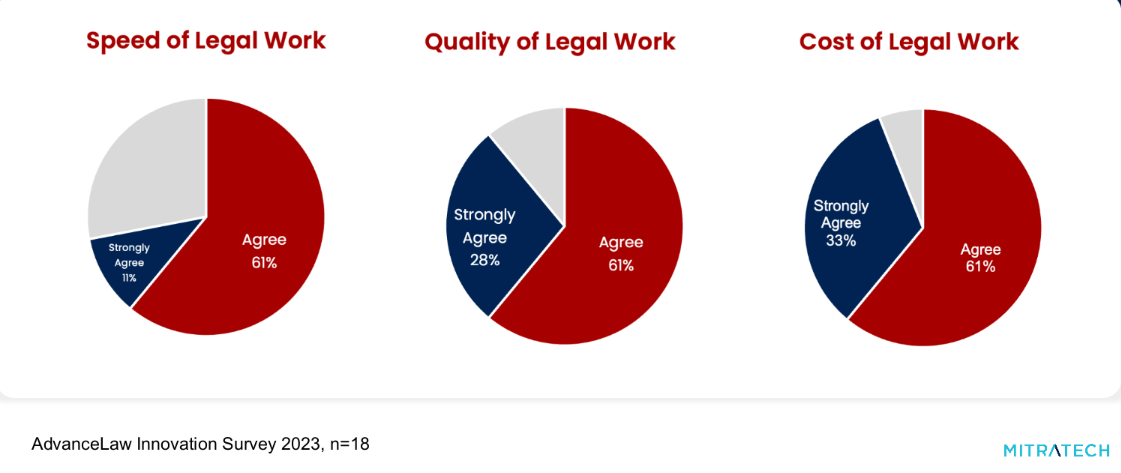
You can shorten the lead time it takes to comprehend an EU-commissioned opinion or directive that’s voluminous. You can create fewer first drafts and do more meaningful editing. Martin Durkin even gave the example of recurring litigation (like mass arbitration, for example), where you can use AI to review data about large masses of claimants. The technology breaks the data into subcategories to resolve matters, creating the briefs needed to manage the claims in a cost-effective, faster manner.
“On an individual basis for thousands, that’s very time-consuming and expensive,” he explained. “But with AI and document automation, you can review matters and then present the arguments that have been successful in the past against particular claims, which, in turn, enhances your quality when reviewing large volumes of data.”
But while 89% of AdvanceLaw respondents think technology’s biggest impact will be on productivity, our panelists think quality of work will also see a significant shift – particularly in the area of insights.
Business intelligence and insights are benefits of AI too often overshadowed by the promise of faster output. Bill Deckelmann gave a great example of its application: “If you’re doing M&A for example, it’s good to know what kind of deals are going on in the market. Those insights you can get from GenAI is where you can expect a big impact in the corporate world.”
Meanwhile, using GenAI can also give us a better idea of what it will cost to generate legal work, meaning we can more effectively budget for in-house counsel and start to understand the value of individual tasks.
“This conversation is bigger,” explains Bjarne Tellmann. “It’s going to move beyond productivity to what jobs lawyers should actually be doing – what we’re uniquely capable of and where we should be deploying those capabilities. Firms may even face ethical challenges if they choose not to adopt — can they bill clients for work that can be done at a higher quality and lower cost?”
Martin Durkin agreed we may be a step closer to value-based billing; “We may finally hit the inflection point on moving from billable hours to fixed fees as we focus on the value of what’s being done.”
“It’s an important point,” weighed in our host and moderator, Katherine Shell. “how uniquely positioned these law firms are because they have access to the information. Very few in-house teams have enough metadata in each of these areas to have their own analytics — you need something that cuts across different clients.”
Whether those analytics point to different billing models or budgets remains to be seen, one thing is for certain: GenAI is going to change how we train our teams and interact with our partners and clients.
On the one hand, clients want to know if you’re looking at the whole picture, including the risk. They want to know that you’re not placing their – or the firm’s — data at risk and have collaborative conversations on safe and effective use. Bjarne Tellmann advises that if you don’t already have questions on innovation and AI in your Panel interviews and RFIs – you should be considering it. Many firms are already sending along terms and conditions for AI use and the security of their proprietary data.
The other side of this equation is both training lawyers how to use AI. As Alexander Brown explains it, “Prompt engineering is going to become part of the core skill set of lawyers, at every firm. It’s really about education and creating a safe space for people to learn how to use these tools effectively rather than immediate productivity.”
Martin Durkin stepped in with an example of using AI to train lawyers. “You can train one of these models fairly quickly to create the first draft of discovery and IT cases (which is frankly better than a first-year lawyer who hasn’t done this before and is just learning). Then, showing it to the lawyer and letting them watch the AI model review a complaint and flag issues.”
Regardless of what side of the conversation you’re on, GenAI is going to change your business, your relationships, and what we prioritize. There are three key ways you can prepare for the disruptive change:
- Have collaborative conversations early and often with clients and partners
- Train lawyers across the board on how to prompt and use AI models securely
- Create a stellar reputation for quality and consistency ahead of time to establish the trust needed for your stage of investment and innovation
Contact AdvanceLaw to find innovative, high quality, diverse firms–whether it’s for your next matter or for all of your legal work!
Interested in Becoming an AdvanceLaw Member?
Join a network of General Counsel who are passionate about our model and want to engage our network of highly motivated outside counsel.
Please contact us to explore whether your legal team is a good fit.


